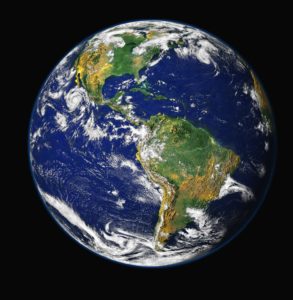 The world is heating up quickly and climate scientists are very worried and scared about what's in our future. A recent survey conducted by The Guardian finds that climate scientists are very pessimistic about our ability to limit future temperature increases.
The world is heating up quickly and climate scientists are very worried and scared about what's in our future. A recent survey conducted by The Guardian finds that climate scientists are very pessimistic about our ability to limit future temperature increases.
By the way, this past April was the 11th straight month of global record-breaking heat, and it looks like this trend will continue. Most of the scientists surveyed felt that we will blow past the internationally agreed 2.7 degrees F and will hit at least a 4.5 degrees F increase in this century. Almost half thought there would be a 5.4 degrees F increase.
This uncontrolled temperature increase will result in catastrophic changes for the world. Famines, mass migrations, heatwaves, wildfires, extreme storms! It's on us, especially our governments, to take action. Now!
Excerpts from The Guardian: World’s top climate scientists expect global heating to blast past 1.5C target
Hundreds of the world’s leading climate scientists expect global temperatures to rise to at least 2.5C (4.5F) above preindustrial levels this century, blasting past internationally agreed targets and causing catastrophic consequences for humanity and the planet, an exclusive Guardian survey has revealed.
Almost 80% of the respondents, all from the authoritative Intergovernmental Panel on Climate Change (IPCC), foresee at least 2.5C of global heating, while almost half anticipate at least 3C (5.4F). Only 6% thought the internationally agreed 1.5C (2.7F) limit would be met.
Many of the scientists envisage a “semi-dystopian” future, with famines, conflicts and mass migration, driven by heatwaves, wildfires, floods and storms of an intensity and frequency far beyond those that have already struck.
Numerous experts said they had been left feeling hopeless, infuriated and scared by the failure of governments to act despite the clear scientific evidence provided.
“I think we are headed for major societal disruption within the next five years,” said Gretta Pecl, at the University of Tasmania. “[Authorities] will be overwhelmed by extreme event after extreme event, food production will be disrupted. I could not feel greater despair over the future.”
But many said the climate fight must continue, however high global temperature rose, because every fraction of a degree avoided would reduce human suffering.
The Guardian approached every contactable lead author or review editor of IPCC reports since 2018. Almost half replied, 380 of 843. The IPCC’s reports are the gold standard assessments of climate change, approved by all governments and produced by experts in physical and social sciences. The results show that many of the most knowledgeable people on the planet expect climate havoc to unfold in the coming decades.
The climate crisis is already causing profound damage to lives and livelihoods across the world, with only 1.2C (2.16F) of global heating on average over the past four years. Jesse Keenan, at Tulane University in the US, said: “This is just the beginning: buckle up.”
The experts said massive preparations to protect people from the worst of the coming climate disasters were now critical. Leticia Cotrim da Cunha, at the State University of Rio de Janeiro, said: “I am extremely worried about the costs in human lives.”
The 1.5C target was chosen to prevent the worst of the climate crisis and has been seen as an important guiding star for international negotiations. Current climate policies mean the world is on track for about 2.7C, and the Guardian survey shows few IPCC experts expect the world to deliver the huge action required to reduce that.
Younger scientists were more pessimistic, with 52% of respondents under 50 expecting a rise of at least 3C, compared with 38% of those over 50. Female scientists were also more downbeat than male scientists, with 49% thinking global temperature would rise at least 3C, compared with 38%. There was little difference between scientists from different continents.
The experts were clear on why the world is failing to tackle the climate crisis. A lack of political will was cited by almost three-quarters of the respondents, while 60% also blamed vested corporate interests, such as the fossil fuel industry.
Many also mentioned inequality and a failure of the rich world to help the poor, who suffer most from climate impacts. “I expect a semi-dystopian future with substantial pain and suffering for the people of the global south,” said a South African scientist, who chose not to be named. “The world’s response to date is reprehensible – we live in an age of fools.”
